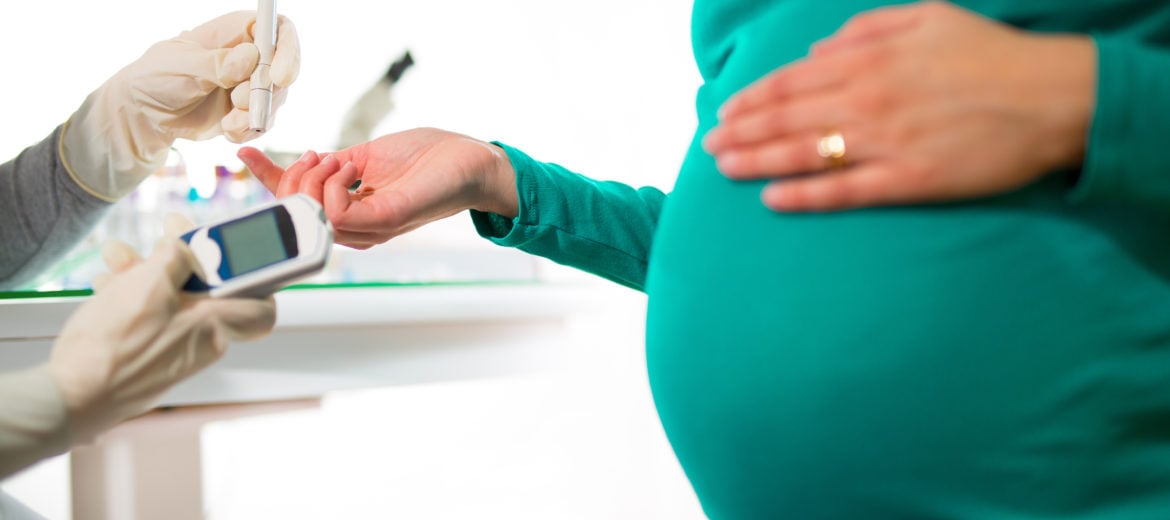According to a study conducted by the Indian Journal of Endocrinology and Metabolism, 4 million Indian women developed GDM during the course of their pregnancy!
Antara Deshpande (30) was approaching her 24th week of pregnancy when her gynecologist,Dr. Kusum Lata Bhardwaj, at Sitaram Bhartia Hospital in South Delhi, asked her to get her gestational diabetes test done.
The tests revealed that Antara’s blood sugar levels were alarmingly high. She had developed gestational diabetes mellitus (GDM). Dr. Kusum Lata Bhardwaj advised her to consult Dr. Silviya Irene, Consultant Diabetologist and Endocrinologist at Sitaram Bhartia.
Dr. Silviya examined her reports and asked her not to panic or worry. “It’s a good thing it was detected early. Diabetes in pregnancy should not be a major cause of concern for your baby if your blood sugar levels are appropriately controlled at the right time with the right medication.”
“But how did I develop gestational diabetes without any prior history of diabetes?” Anatara asked.
Watch Priya’s Pregnancy journey with GDM:
What causes GDM?
Gestational Diabetes Mellitus or GDM is a condition in which the blood sugar levels are deranged in a pregnant woman during her second or third trimester of pregnancy, who has had prior normal levels of blood glucose.
Dr. Silviya explains, “In a pregnant woman, there is an organ called the placenta in the uterus which acts as a conducting system between the mother and her baby. This placenta produces a number of vital hormones that are needed to sustain a pregnancy.”
“The hormones tend to increase the mother’s blood sugar levels by making maternal insulin resistant to action.”
In a mother, the increase in sugar (hyperglycemia) is overcome by the body in the absence of risk factors such as:
- Family history
- Pre-pregnancy obesity
- PCOS
- Sedentary and unhealthy lifestyle
- High cholesterol levels
- Previous history of GDM or hypertension
On the other hand, the presence of these factors can make a woman prone to GDM.
“But there is no need to worry. The greatest reassuring factor is that the blood sugar levels usually normalize post-delivery,” Dr. Silviya reassured Antara.
What are the signs of gestational diabetes during pregnancy?
This is the next question Antara asked since she didn’t experience any symptoms of diabetes at all.
Dr. Silviya said, “Most women with GDM do not experience any noticeable signs of developing diabetes. It is mostly when they test for GDM that the diagnosis is made.”
But there should be a stronger suspicion if you exhibit the following signs:
- Excessive weight gain
- Dark pigmentation (Acanthosis Nigricans)
- Worsening acne in face, back, chest
- Abnormal increased male pattern of hair growth in face, chin, chest, abdomen
- Large babies (Macrosomia in ultrasound)
That is why as a part of prenatal care, it is very important to get checked for gestational diabetes (GDM diagnosis).
“In pregnant women with no history of diabetes, test for GDM should be done at 24 to 28 weeks of gestation.”
“Are certain women are more likely to develop diabetes in pregnancy? asked Antara.”
Risk factors of developing Gestational Diabetes Mellitus (GDM)
Indian women are genetically predisposed towards developing gestational diabetes. But there are certain factors which might increase your chances of having it. They are –
- Being overweight or obese in pre-conceptional period
- Family history of diabetes
- Have previously given birth to a baby weighing more than 4.5 kg
- Age (Women older than 25 are more prone to GDM)
- History of GDM in previous conceptions
- History of PCOS
Antara was majorly concerned about only one thing – will gestational diabetes harm her baby in any way?
Will gestational diabetes affect the baby?
“GDM can have 2 implications in a baby, both short and long term. In the shorter period, an increase in maternal glucose leads to increased glucose levels in the baby. This is similar to overfeeding a baby, which results in larger babies and potential complications during delivery.”
“In the long run, the baby is more at risk of being overweight or obese, and developing diabetes. It is, thus, important to note that better glucose exposure reduces the baby’s risk of developing future complications.”
In general circumstances, the risks associated with GDM at infancy are:
- Excessive birth weight
- Risk of obesity
- Damage to shoulders during birth
- High chance of developing respiratory problems at birth
Upon hearing this, Antara determined that she would not let her gestational diabetes harm her baby in any manner. She wanted to know how to deal with GDM.
GDM management – How to treat diabetes in pregnancy?
The four important aspects of managing diabetes during pregnancy are:
- Healthy lifestyle & dietary changes
- Regular monitoring of blood sugar levels
- Use of medication, preferably insulin, for better outcomes
- Keeping blood glucose levels under control
Antara was urged to make sure she met the following blood glucose targets:
- Fasting – less than 90 mg/dl
- Pre-meal or before eating- less than 95 mg/dl
- 1 hr post meals – less than 140 mg/dl
- 2 hr post meals – less than 120 mg/dl
Dr. Silviya’s encouraging words helped Antara feel more confident about her condition. Unsure about taking insulin, she wondered if she would be put on insulin as well.
It was promptly explained to her that there is an urgent need for monitoring and maintaining blood sugar levels with GDM. The target levels are reiterated and would have to be reinforced using strict measures.
“If target blood sugar levels cannot be achieved with diet and exercise alone, then the need for insulin arises. Insulin does not cross the placenta, and hence cannot reach the baby, which makes it the safest way to reduce high blood sugars in pregnant mothers.”
Dr. Silviya also emphasized at the consultation that if there is any need for insulin, it will only be till the time she delivers. The mother is usually taken off insulin post-delivery, as against the myth that the use of insulin lasts lifelong.
Read More: Insulin – Importance In Diabetes Management
“What about diet? Do I need to follow any special diet?” asked Antara.
GDM Diet
Women with GDM need to follow a particular diet to make sure their blood sugar levels are properly maintained. Antara was referred to the diabetes educator who counseled her and helped her develop a tailor-maid diet plan customized according to her daily activity pattern, food choices, and practices.
She was recommended to avoid food items containing high sugar levels because they may cause a spike in blood sugar levels. Such items include potatoes, sooji, white rice, sweeteners, aerated drinks and refined cereals like maida.
“Avoid sweets and desserts. Try to follow a high protein and high fiber diet by including food items like whole grains, pulses, sprouts, fresh green vegetables, lean meats like fish. Also, have more dairy products like milk or curd as these are high in protein and have a low impact in raising the blood sugar levels.”
Watch: What Your Gestational Diabetes Diet Should Include
Labour and Delivery in GDM
“Due to insulin resistance and high glucose levels, pregnant women with gestational diabetes may sometimes have bigger babies but that does not necessarily require a cesarean section,” Dr. Kusum Lata Bhardwaj said.
“Induction of labour is recommended at 38-40 weeks of gestation if there is no sign of going into labour before that.”
But it is important to keep a check on your blood sugar levels even after giving birth.
“It is advisable to test for diabetes (fasting blood sugars, and 2-hours post-75gm of glucose) after 6-13 weeks of giving birth. Even if the test is normal, it must be carried out every year after that, especially if the woman is planning to have another child in the future.”
To avoid developing diabetes during another pregnancy, the mother should carry on with the same lifestyle modifications to ensure her sugar levels are in control.
After seeking medical guidance from both the doctors, Antara felt confident enough to tackle her gestational diabetes and ensure that she and her baby are healthy at the end of the day.
Questions To Consider For GDM Management
-
Are You Monitoring Your Blood Sugars 6 Times A Day?
An important step towards GDM management is frequent monitoring of your blood sugar levels everyday.
“The number of times you will be asked to measure your blood glucose levels may vary according to your glucose profile (in case of high fasting, or high 1-hour/2-hours post meal glucose levels, for example), but 6 times a day is the norm,” says Dr. Silviya.
You will be encouraged to invest in a glucometer, as it is a handy and portable sugar-testing machine that allows you to monitor and compare your sugar levels at ease.
-
Have You Incorporated The Food-Plate Method In Your Dietary Plan?
Creating a personalized meal plan that provides adequate nutrition and limits carbohydrate content so as to regulate the mother’s weight to an appropriate level is essential.
“Incorporate the food-plate method in your daily meal plans so that you are able to regulate your diet easily.”
Your meals should incorporate 2 servings of vegetables, 1 serving of grains or cereals and 1 serving of protein like pulses, cottage cheese or eggs in your meals. Discuss the diet plan with your nutritionist for a comprehensive approach.
-
Did You Go For Your 30-Mins Walk Today?
“One of the most effective ways to control weight gain and increase insulin sensitivity is regular exercise. Make sure you make a habit of walking everyday for 30-40 mins or doing appropriate pregnancy exercises as advised by our physiotherapists.”
-
Have You Gotten Your Follow-Up Checkup This Month?
“An essential step towards timely management of your condition is approaching your doctor for your routine health check-ups. It is a commonly accepted fact that not only do regular visitations help the mother monitor her and her baby’s overall health, but also make prescribed changes to her treatment, if needed.

Medically Reviewed by Dr. Kusum Lata Bhardwaj
MBBS Panjab University, Chandigarh (2008); MD Panjab University, PGIMER, Chandigarh (2012); DNB National Board of Examinations (2013)
Experience: 10+ years

Dr. A. Silviya Irene, MBBS, Tamil Nadu Dr. M.G.R. Medical University, Tamil Nadu (2005); Diploma in Diabetology, Tamil Nadu Dr. M.G.R. Medical University, Tamil Nadu (2008); D.N.B (General Medicine), National Board of Examinations (2012); Senior Residency in Endocrinology from Safdarjung Hospital
Do you have more questions in your mind? Ask our senior gynecologist. Book a consultation by calling us on +91 9871001458. Consultation is available at our hospital in South Delhi.

